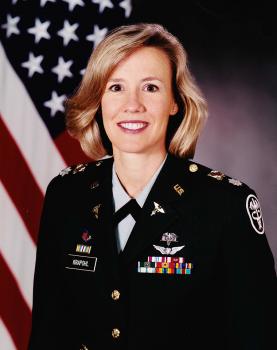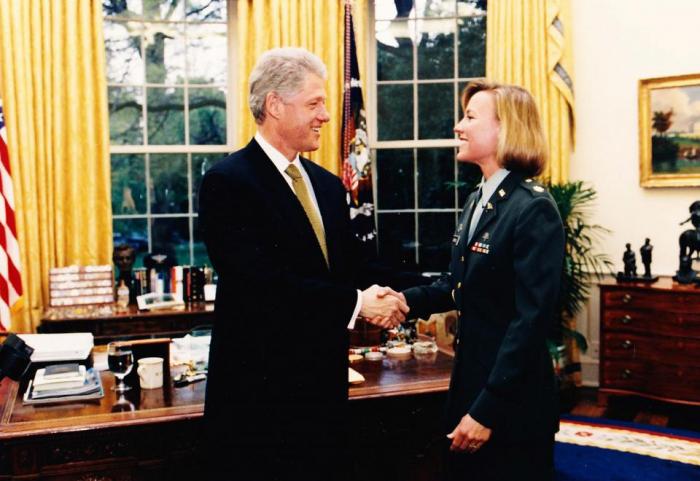Veterans Week alumni spotlight: Greta Krapohl (Ph.D. ’11), U.S. Army
 Becoming a nurse was always in Greta Krapohl’s plans, but serving in the U.S. Army wasn’t supposed to be long term. What began as a four-year obligation to earn an ROTC scholarship turned into two decades of distinguished military service leading into a doctorate from the University of Michigan and her current role as research investigator in Michigan Medicine’s Department of Surgery and associate director of the Michigan Surgical Quality Collaborative.
Becoming a nurse was always in Greta Krapohl’s plans, but serving in the U.S. Army wasn’t supposed to be long term. What began as a four-year obligation to earn an ROTC scholarship turned into two decades of distinguished military service leading into a doctorate from the University of Michigan and her current role as research investigator in Michigan Medicine’s Department of Surgery and associate director of the Michigan Surgical Quality Collaborative.
“My career in the Army started with my roommate in college, Karen, who encouraged me to learn more about ROTC. Next thing I know I’m in basic training at Fort Knox, Kentucky, doing pushups,” Krapohl recalled. “I was drawn by a feeling of adventure and service, and I liked the idea of traveling around the world. When I received a full ROTC scholarship that paid for my nursing school tuition at the University of Delaware, I would owe the Army four years — that seemed like a good trade-off.”
During her 20 years in U.S. Army Nurse Corps, Krapohl served in the United States and overseas, gaining extensive experience in medical evacuation, triage and emergency medicine. From 1995 to 1997, she was a member of the White House Medical Unit, coordinating medical contingency planning and care for President Bill Clinton, Vice President Al Gore and their families. Krapohl later became Deputy Commander for Nursing and Clinical services at Andrew Rader U.S. Army Health Clinic in Virginia and retired as a lieutenant colonel in 2006.
Krapohl earned her master’s degree in nursing from Georgetown University during her time as an Army nurse. After retirement, she came to Ann Arbor to pursue her Ph.D. at the U-M School of Nursing, where emeriti faculty Bonnie Metzger, Ph.D., RN, FAAN, and Richard Redman, Ph.D., played an invaluable role in her development as a nurse scientist.
“The University of Michigan gave me the most well-rounded, challenging and thorough education I could have ever imagined,” she said. “Drs. Metzger and Redman were there for me through every phase of my doctoral education and are forever deserving of my deepest gratitude.
“They say that a Ph.D. is a lonely pursuit, but I found just the opposite. My time at the School of Nursing gave me the opportunity to make a smooth transition from the Army to civilian life — a ‘soft landing’ after 20 years of regimentation.”

Krapohl draws on her Army experiences every day. Whether in personal or professional life, her military service informs how she approaches everything from daily routines to pressing issues in the workplace.
“There’s not a day that goes by where I don’t draw on my Army experiences,” she said. “When I retired from the Army, I said I would never wake up at 5 a.m. — I still do. I said I would never exercise early in the morning or do pushups and situps, but I still do. I always have a contingency plan, and my co-workers laugh when I tell them something is not an emergency, but working in high-stress crisis and emergency situations gives you perspective on how to prioritize.”
 In her leadership role at Michigan Medicine, that perspective as an Army veteran has helped Krapohl thrive as a researcher focused on surgical quality improvement and patient care.
In her leadership role at Michigan Medicine, that perspective as an Army veteran has helped Krapohl thrive as a researcher focused on surgical quality improvement and patient care.
“In the Army, I learned that leadership is not a privilege but a responsibility. The best leaders practice servant leadership, putting the needs of those they serve first and promoting a culture where all can thrive. I try my best to live by the example great leaders have set for me.”
Teamwork is essential for the success of any nurse, but Krapohl understands what military nurses bring to health care in a civilian setting, and why they are an especially valuable asset to the advancement of the nursing profession.
“Military nurses absolutely bring a different skill set to the civilian world. Teams work interdependently to emphasize one another’s strengths and complete a common mission, and they are great team players,” she said. “When I meet another military nurse, I know they have made personal sacrifices in service to others, and I know I can depend on them to do what they say they are going to do.”





